Tour de Greece – Greece day by day – part 3
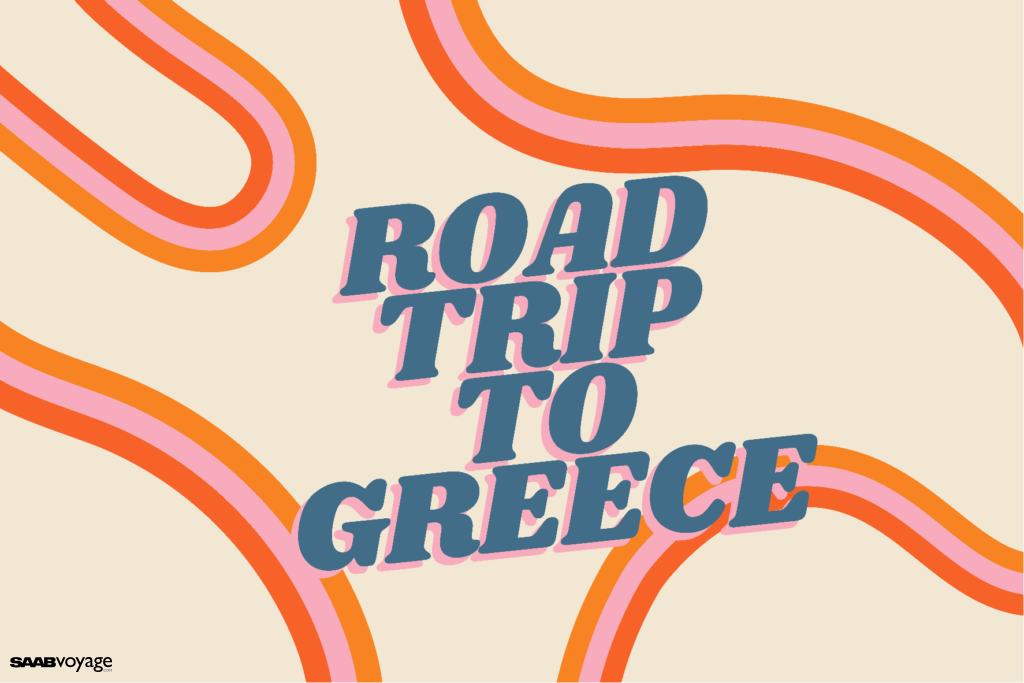
Greece back and forth. In the previous episode, we finished with a tour of Athens. Here is the continuation.
Index
Friday – from Athens via Marathon to Delphi
We left the capital of Greece. The plan for today: to drive through Marathon and end the day at Delphi.
Marathon
From the important objects we saw the statue of Menelaus – his helmet was in a museum in Athens. Also the tumulus – a tomb mound where warriors were buried.
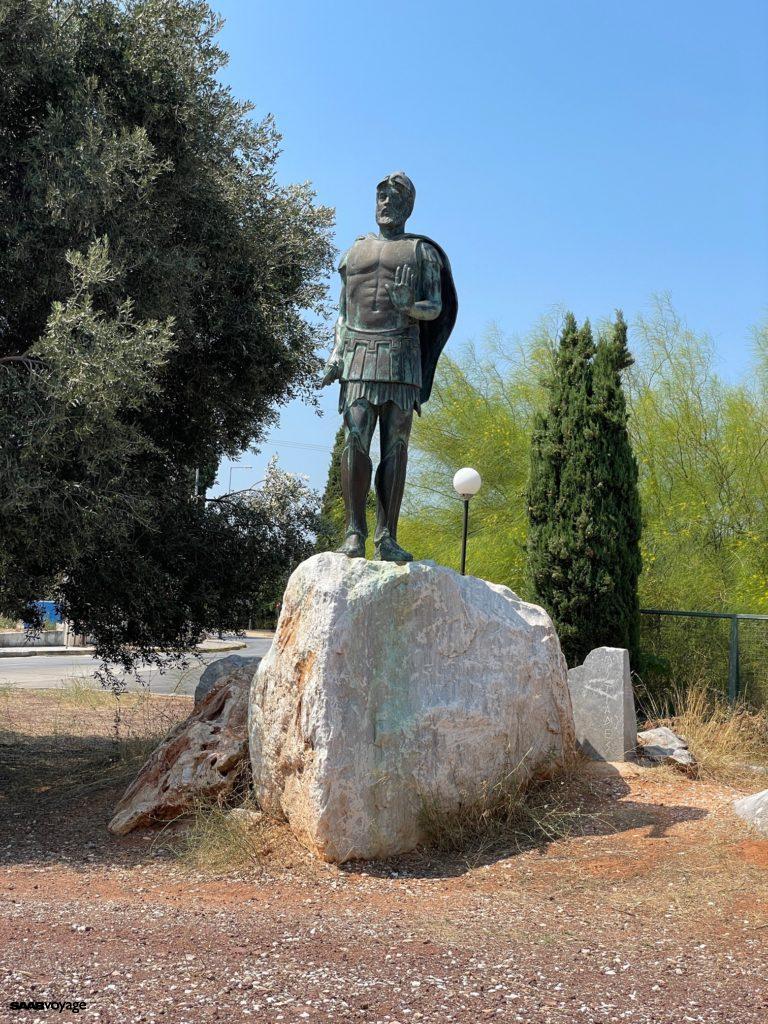
In doing so, we understood the real purpose of the original marathon run – that is, the famous run by Philipides after a victorious battle. He did not run to declare victory, but to warn the Athenians that now was the time to prepare for an attack by the Persians, who were approaching from the sea.
The length of the marathon run is also arbitrary. There were two roads leading from Marathon to Athens, a longer flat one and a shorter one through the mountains. Philippides left no trace of which route he took. The distance of 42195 metres is quite a modern subject, set for the London Olympics in 1908. And more precisely, this is where the grandstand of King Edward VII fell, who wanted to see the finish line well.
Besides, there was already a cemetery in Marathon much earlier and the local archaeological museum is dedicated to it.
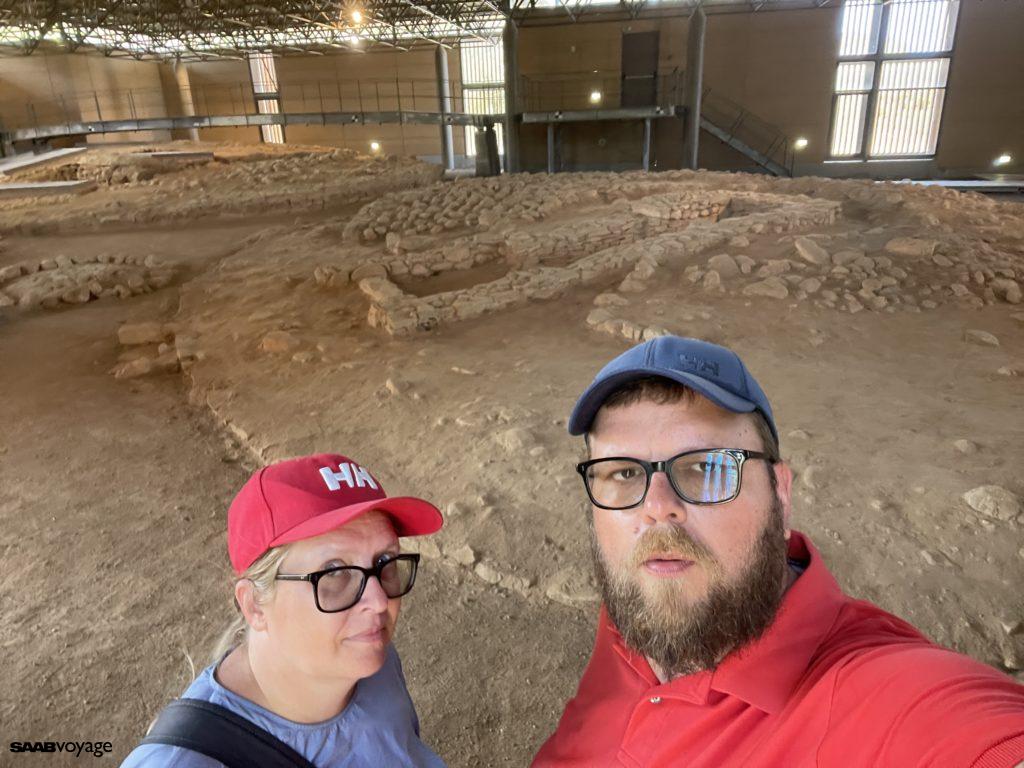
Euboea
We drove on. We drove along a pretty route by the sea, with water splashing on the bonnet. We arrived on an island whose name consists almost entirely of vowels: Euboea. Entry via one bridge, exit via another.
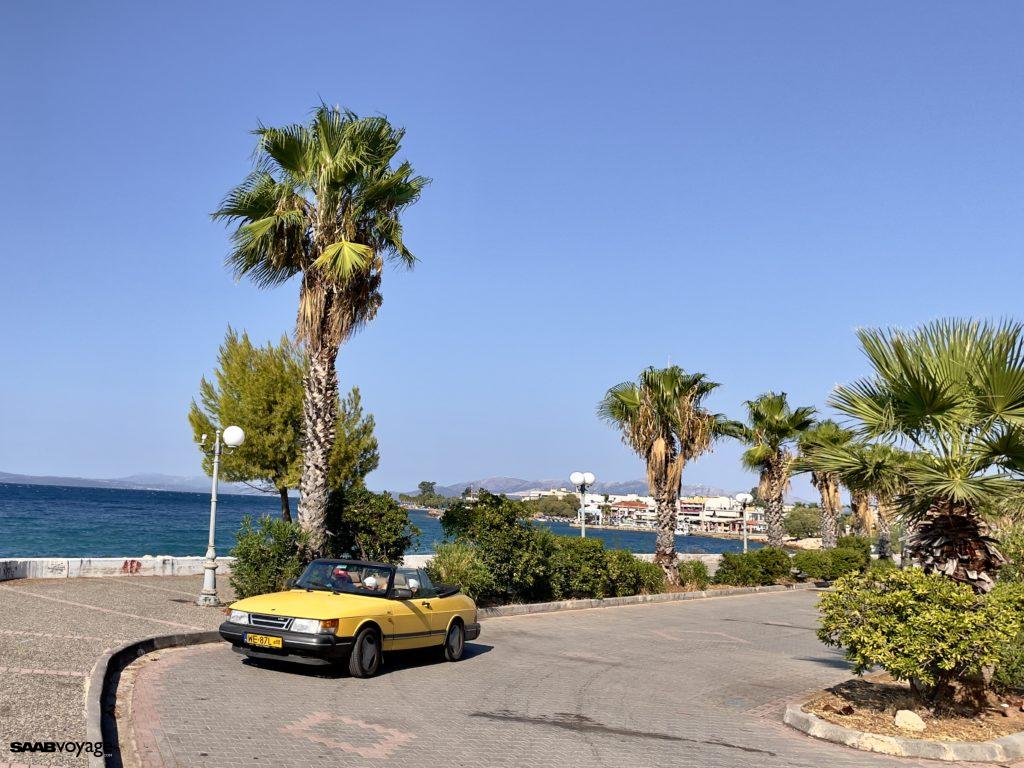
Delphi
We have reached Delphi in the evening. The town is tiny. One-way roads, steep and narrow by the way. When parking in front of the hotel a hot pink brook appeared under the car. We agreed to top up in the morning and now it was too late to do anything. There’s no denying that in 35-degree heat, on a long uphill drive, we occasionally saved turning on the heater to further cool the engine. This time we decided that focusing on finding a place to park, might have caused a moment of distraction that ended with the coolant boiling over.
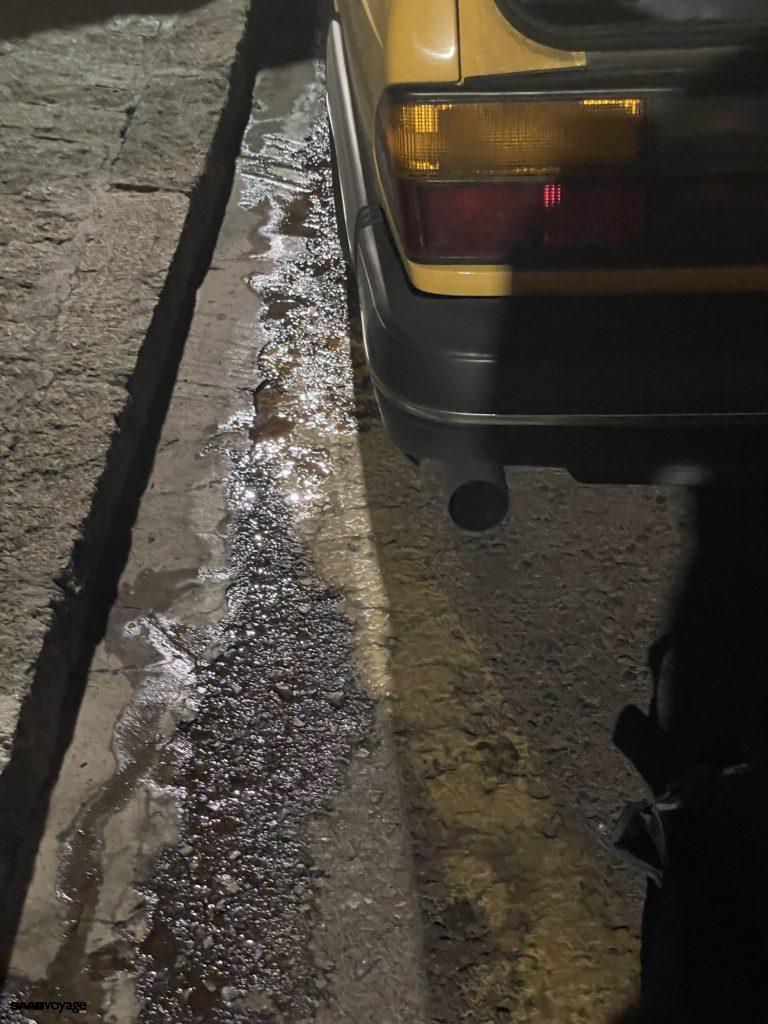
Saturday – “fan day”
In all its kindness, the car boiled over at the hotel door in the evening. The condition at the time was such that it was nothing sensational. The car stopped, the air stopped moving, it puddled, well, tough. Anyway, we were 15 metres from the BP station where we wanted to buy coolant.
Then it turned out that there was also a car service next to the petrol station. What more could we want? 🙂
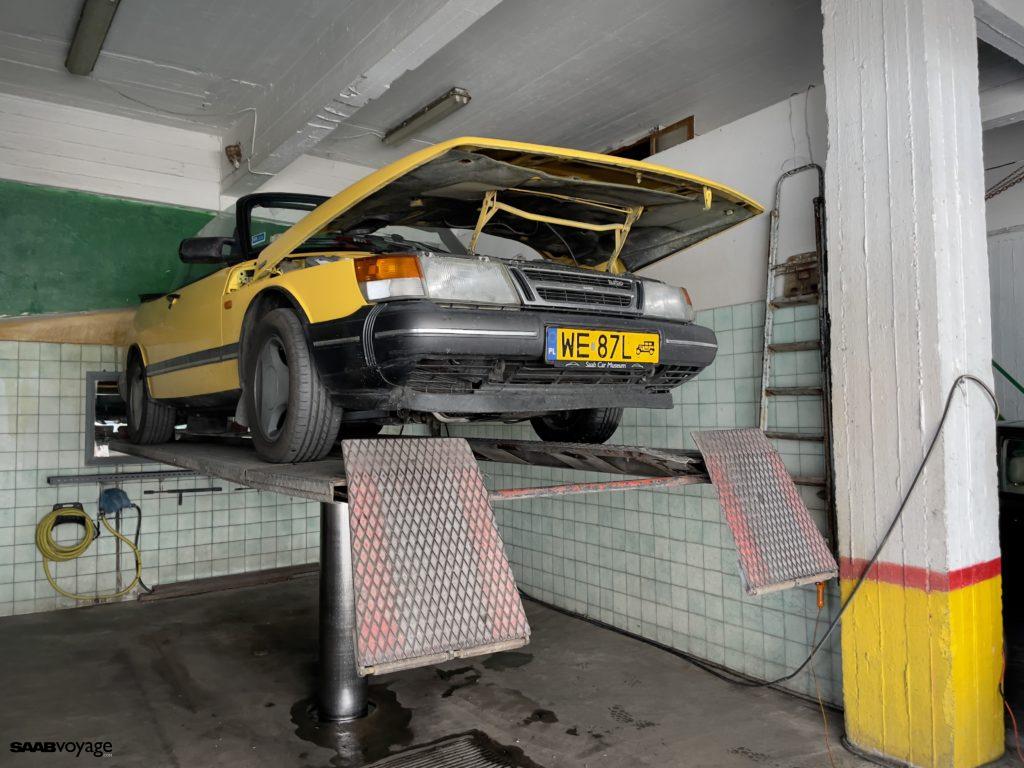
The first shot was a preventive seal of the cooling system.
The mechanic decided that, for peace of mind, he wanted to call in a fellow electrician to check that everything was OK, and we should go sightseeing in Delphi.
As planned, we went to the archaeological museum. What sets them apart from others is the limited time you can spend in one room. This is because there are so many tourists and the exhibits are unique. You will find a lot of objects that were votive gifts to the temple of Apollo. In addition, you’ll find the navel of the world (if anyone was looking), a bronze coachman, twin kuros and a sphinx. As standard, what lies here was brought from the archaeological site.
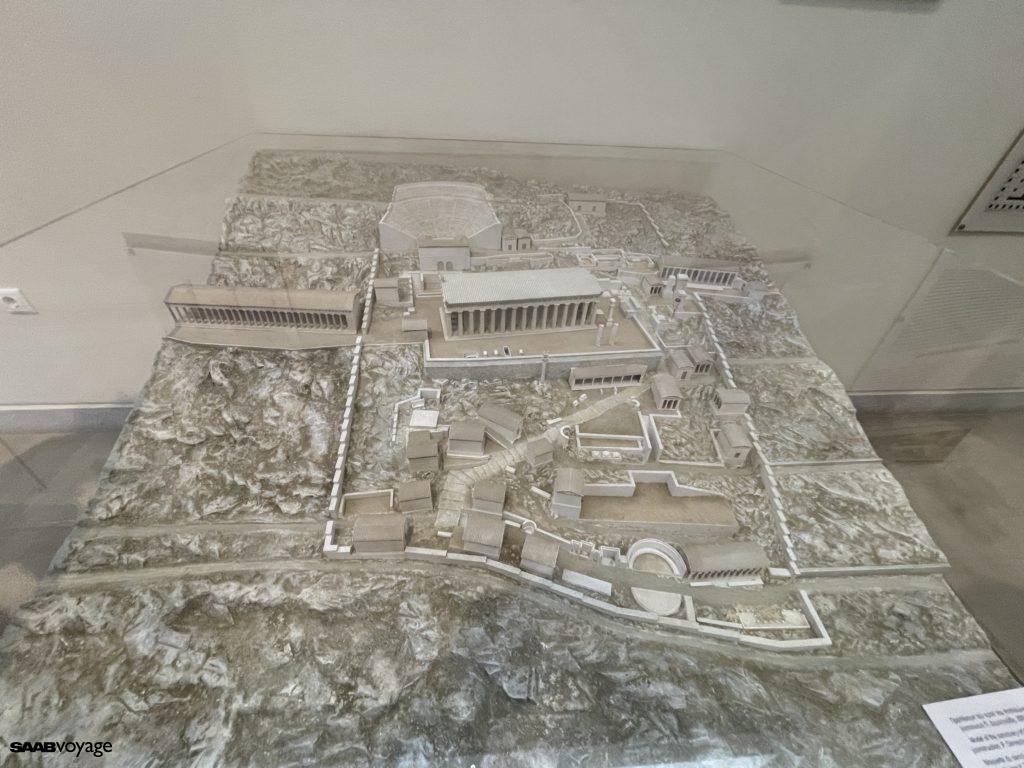
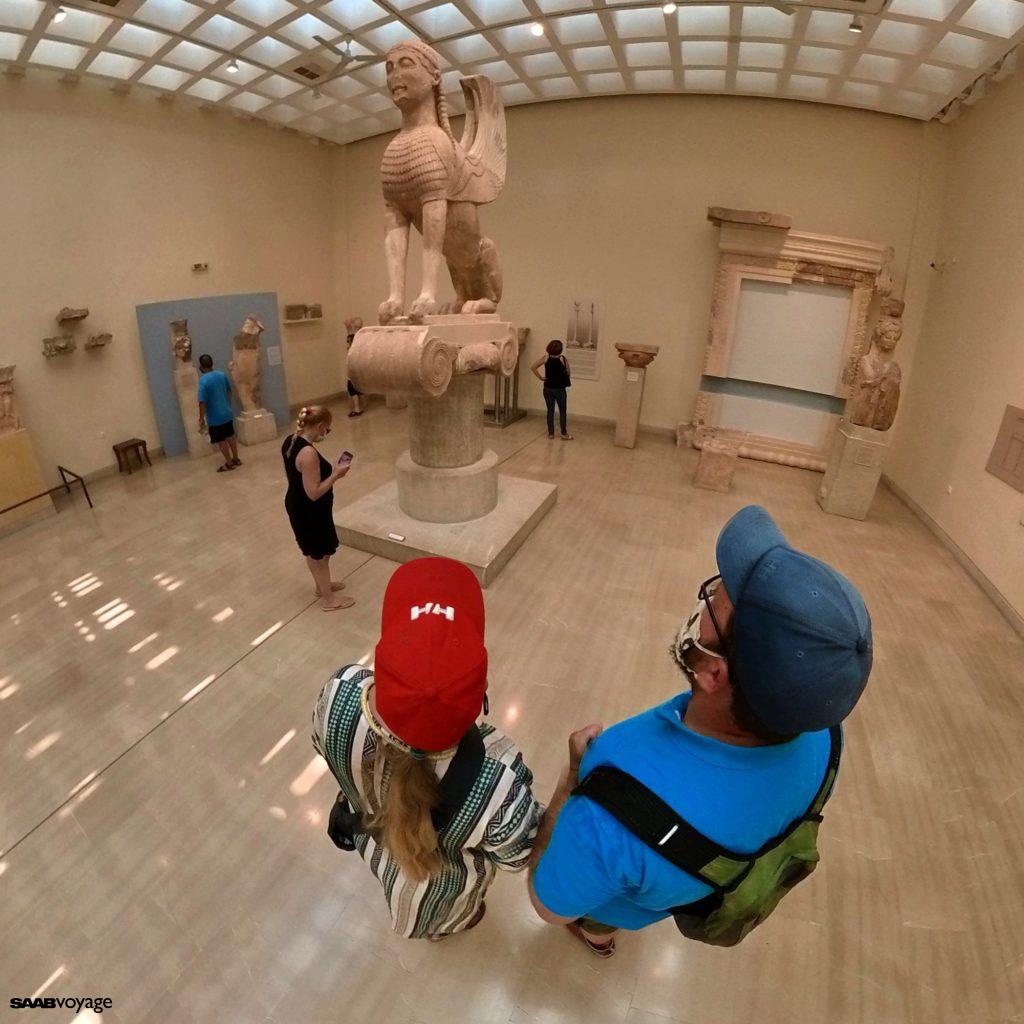
…while we were visiting the museum, the mechanic called. He said the fan had died. It was Saturday noon, nothing would be done by Monday, and we had to stay in Delphi. He reassured us that it would be fine, but we had to stay. We agreed that the car would stay outside the workshop.
There were logistics left to grasp.
We went for a coffee and set about figuring out the reality. We found a hotel that was more promising in terms of breakfast quality. It was more modern and further away from the main street.
We checked (the child was given a developmental-linguistic task to go confirm the facts at the museum ticket office) that the next day we could complete the tour (the archaeological part) on the same ticket. So we have no pressure to rush and explore.
We moved to a new hotel (we had a second set of keys so we could get our stuff out of the boot without bothering the mechanic).
We have already cancelled the accommodation until the end of the trip. The clarification of the situation contributed to the refund of the money regardless of the booking conditions.
We considered several options. Furkot is great here for making alternative plans. In our case, the variable factor was the time we picked up the car on Monday. Depending on the time we had different scenarios.
The assumptions were: we don’t sleep in Serbia, because it’s not allowed, we come home on time – on Wednesday (that’s how we have planned our holiday and taking care of the cats), we want to be in Katowice on Wednesday at 5 p.m. (social matters) and we want to visit one shop in Ostrava in the meantime. We quickly calculated that we would not catch up with the time.
In the end, we agreed on two versions of the situation. If we pick up the car on Monday morning (i.e. by 11:00), we drive through Bulgaria and Romania. We will sleep in Bulgaria and Hungary, somewhere between Budapest and Bratislava.
However, if the car is ready in the afternoon, the first night will be somewhere in the north of Northern Macedonia and the second night in Hungary. We were thinking of visiting one Spomenik in North Macedonia, but here the hour of arrival was important, because of the light. There is no point in taking pictures in the dark, so we let it go.
At the end of the day we had two options prepared and calmly waited for the events to unfold.
We went to test souvlaki, gyros and stuffed pita, to a bar on the sidelines where we saw the staff eating the same thing.
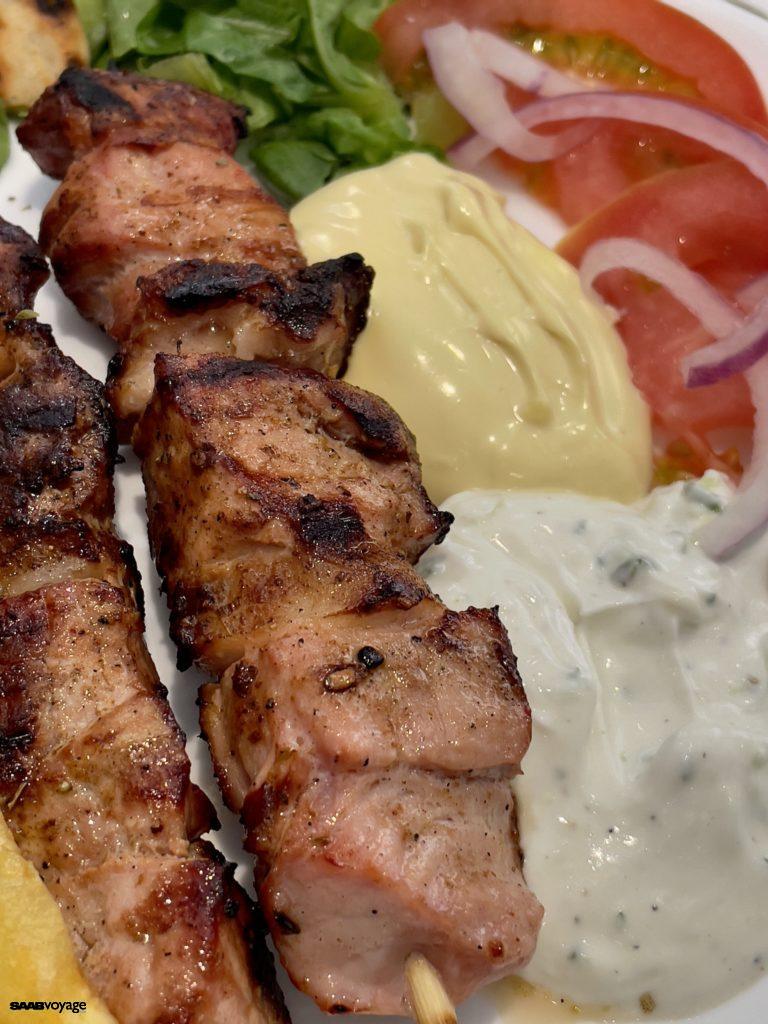
Sunday
When visiting the archaeological site at Delphi, it is worth realizing how important this place was for the Greeks of those times and how much depended on what the oracle said.
The whole inquiry procedure was quite complicated: first a ritual bath, then a gift to the temple – a preliminary one, something in the form of a deposit, then the goat had to be poured with cold water. If it shakes off, it is allowed to ask a question. Then came the moment of asking the question. The witch would mumble something. From her mumblings the priests would compose an answer that did not necessarily make sense, but had to rhyme. All that was left was the gift of thanksgiving and you could go to war, because the gods wanted it that way.
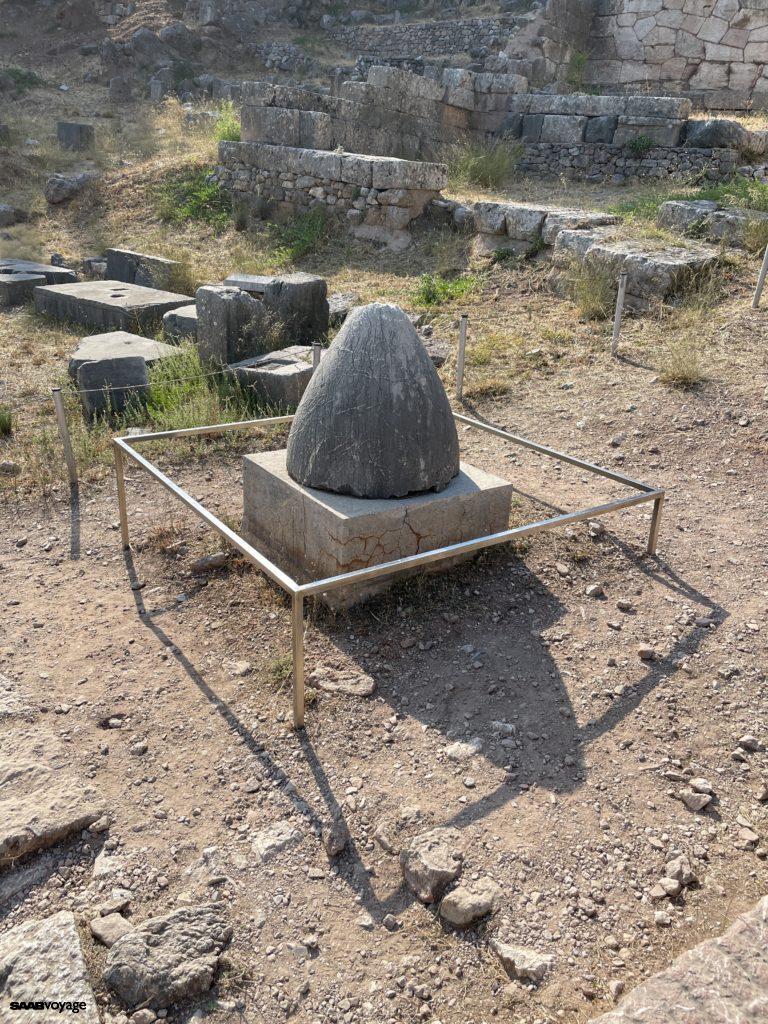
We saw the remains of the oracle. We walked along the sacred way. We looked at the treasuries of individual countries – cities. It is quite an interesting solution. To make it clear from which city the gifts were brought, each city had its own storehouse. We admired the temple of Apollo – looking at what was left of it, and it must have been huge. We also made a cable tie offering for the successful repair of our car. Finally, we looked at the huge amphitheatre. We explored Delphi very thoroughly.
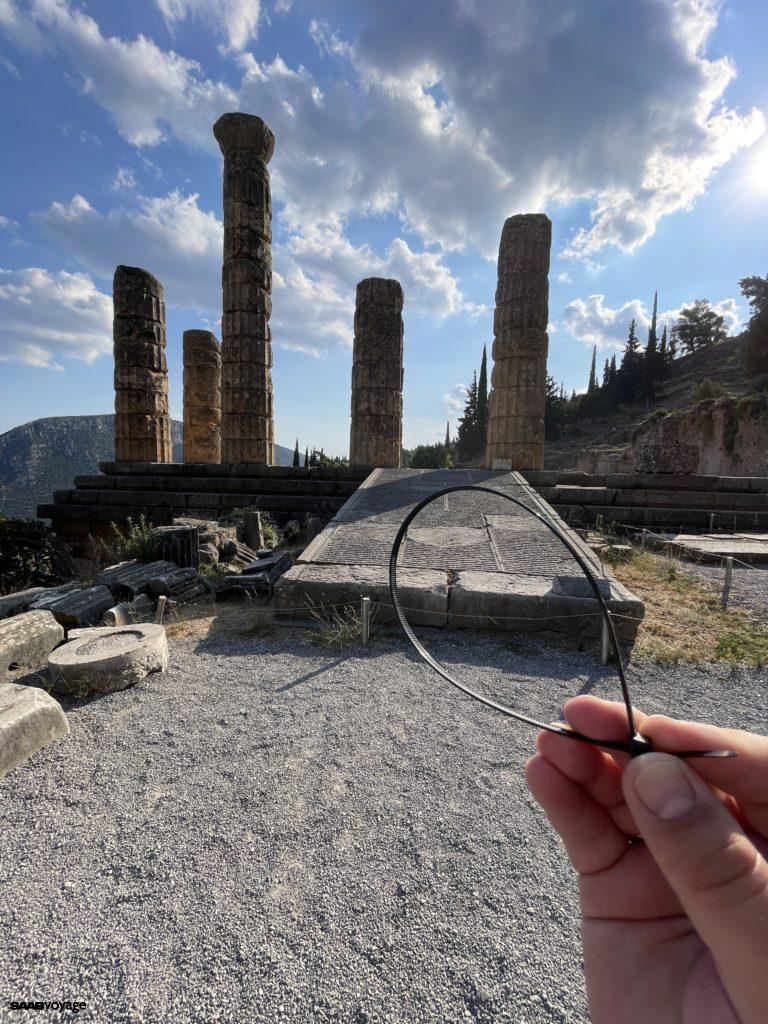
It is interesting that here the figure of Gaia, the mother of the world and the gods, comes up frequently. In other places, it was not so explicit.
On the practical side, it is best to go to the archaeological site in the latter part of the day. Then it is nicely lighted. And if you finish with the beginning of sunset, it is even nicer.
And the conclusion in the end: the current Delphi is an annex to the museum and the archaeological site.
And we are still waiting for the radiator fan.
Monday
A day of waiting. We wait to hear from the mechanic, the mechanic waits for the fan.
At the hotel, the check-out ends at 11:00. After explaining the situation with the car to the lady at the reception, we agree that we stay in the room as much as we need until it turns out that someone has booked the room. And then we can move to the sofas in the lobby. That’s hospitality and kindness.
In the meantime, the mechanic has let us know that he expects the fan to be delivered at 4pm. Which meant we would be leaving at 5pm at the latest. For us, this meant that we would follow plan #2, and we clicked off an overnight stay in Skopje.
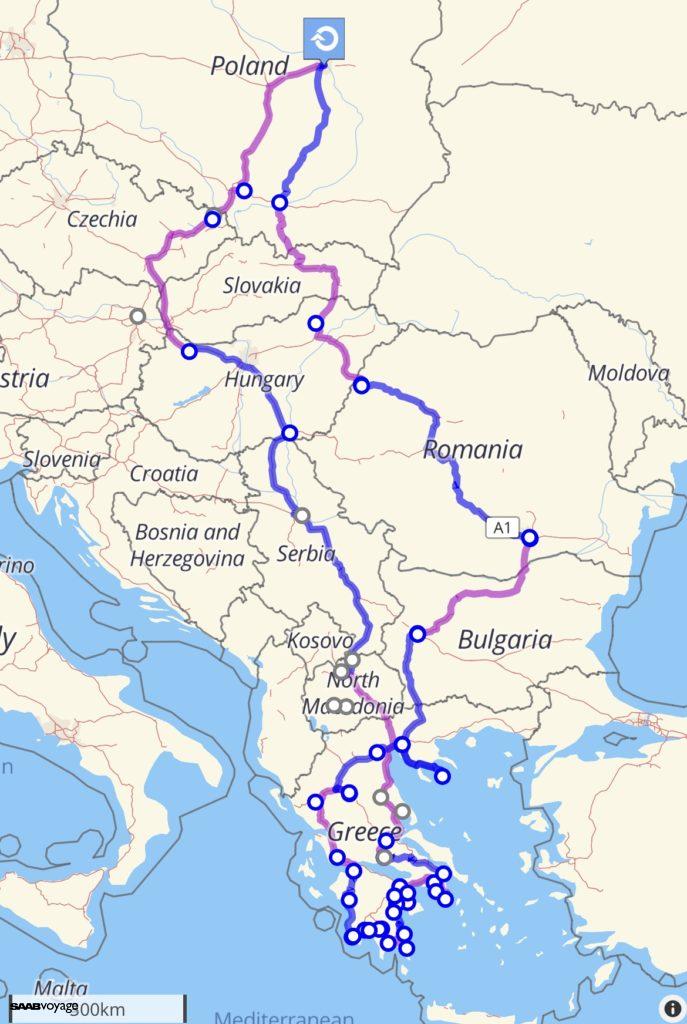
As planned, at 16:30 the first start-up of the cooling system with the new fan took place. Everything worked.
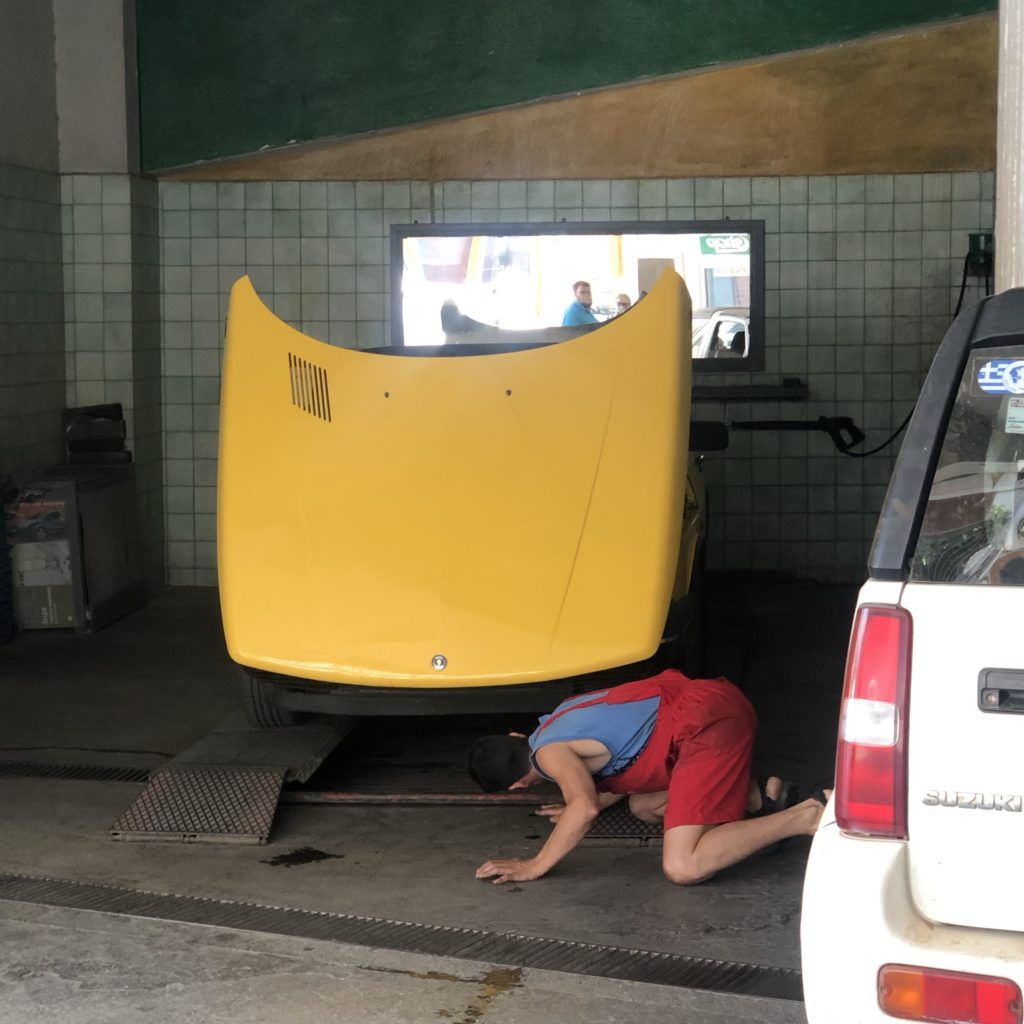
Finally, we set off from Delphi. According to the original plan we went to see Thermopylae. The terrain has changed since the battle, so the mouth of the gorge is no longer by the sea.
A reminder: it wasn’t just the 300 heroic Spartans who defended the gorge! Next to it is a monument to 700 other defenders. The Spartans were there on contract, so that’s why there were only 300 of them there.
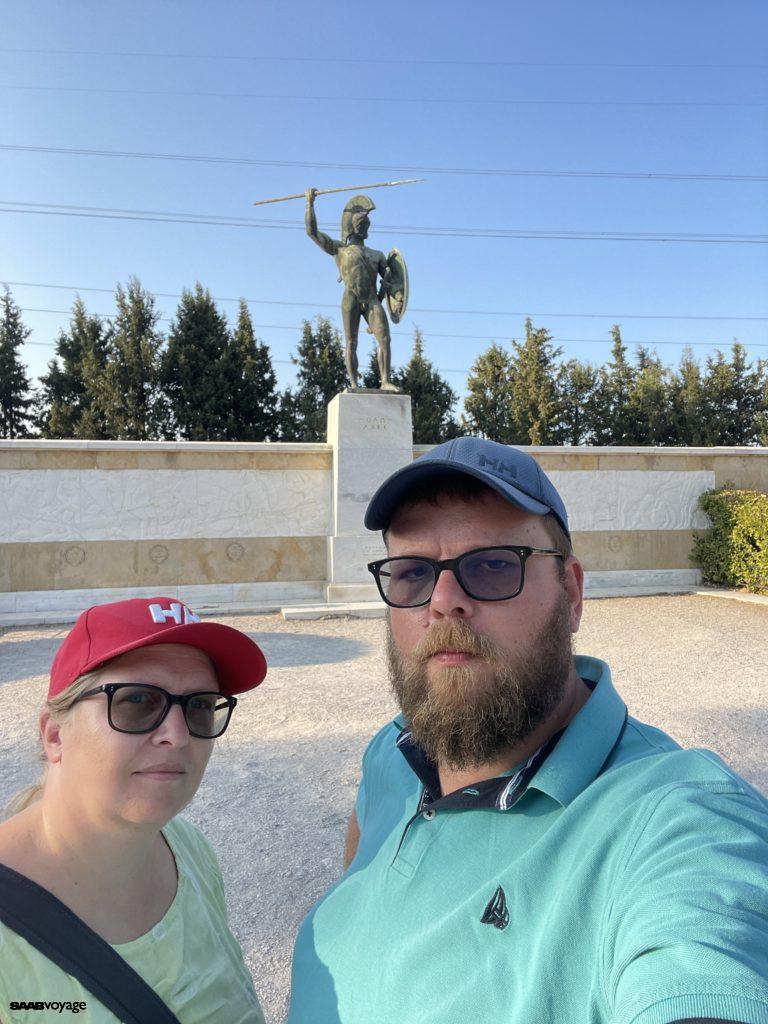
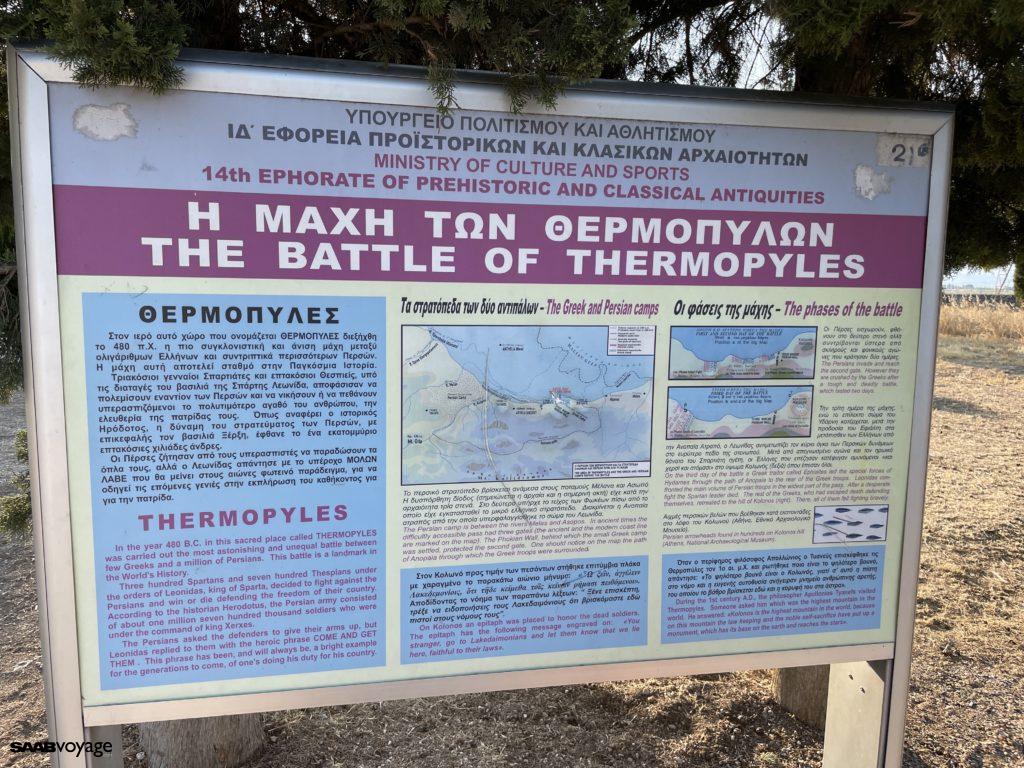
As part of bending the cosmos and abstract events: a man from Poland appeared there, wearing a SWEDEN T-shirt, looking for a battery for his Dacia.
We moved on. The Greek-Macedonian border went quite smoothly. We drove practically along the whole country, all the way to Skopje.
What were our impressions at first sight? North Macedonia is a poor, post-Yugoslavian country. It has fresh but neglected highways. Skopje looks like Poland 30 years ago. With unexpected flashes of modernity. We were impressed by the cars parked on the busway (including police). On a 3-lane road, a man was driving a) against traffic; b) on a scooter. So what, nothing. Dirt and grime on the streets – I don’t mean litter, just an even layer of dirt on everything.
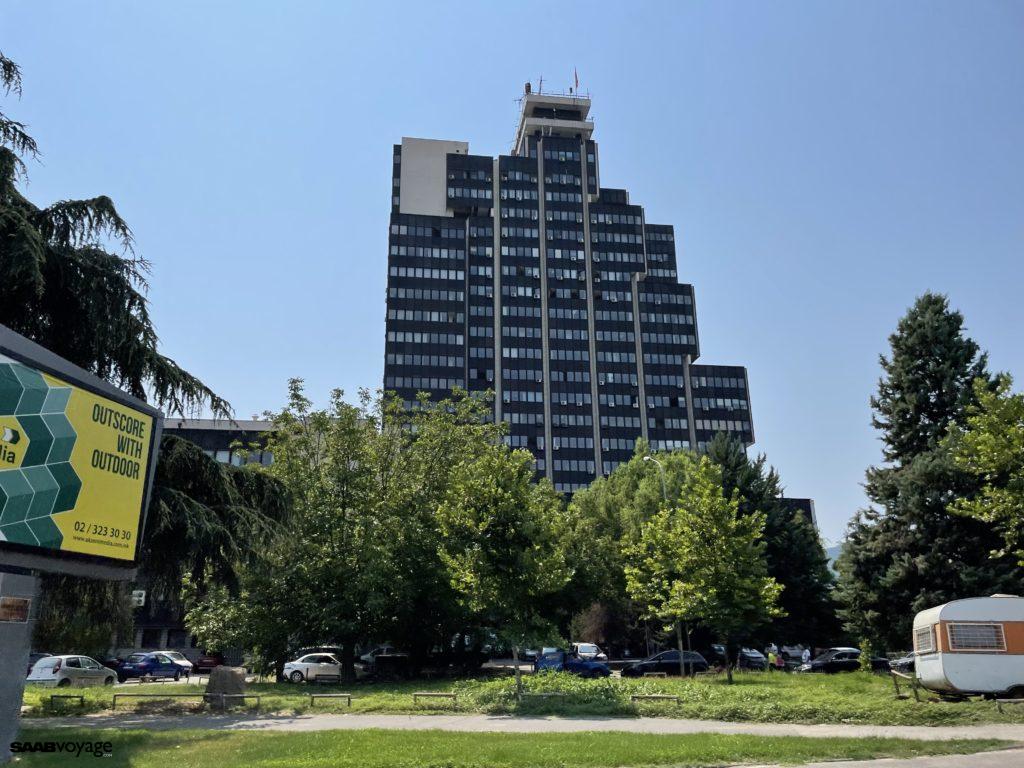
And at the hotel we were given a gift of a CD of Macedonian folk music mixed with techno.
Tuesday
Before leaving the hotel, we prepared to drive through Serbia without roaming (it’s easy to get used to the luxury of unlimited network access, though).
The border between North Macedonia and Serbia greeted us with barbed wire entanglements, a large queue and waiting in the heat.
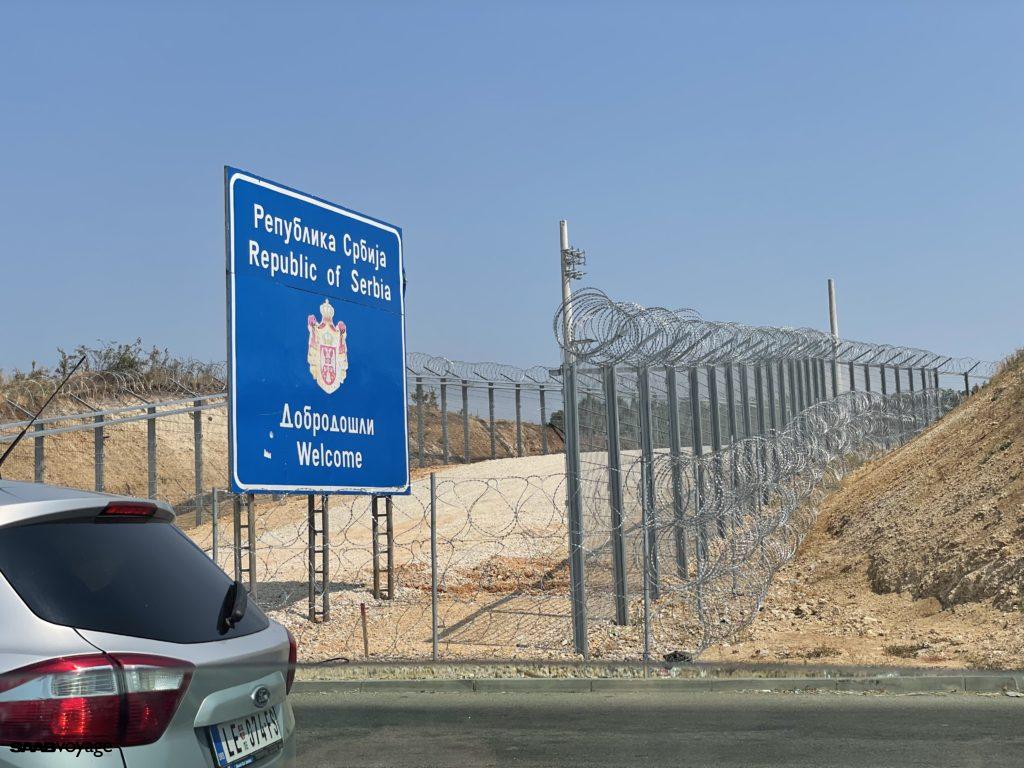
Just over the border in Serbia, by the roadside, meadows are burning. After our experience in Greece, we were moved by this sight. The natives do not care. Just so the fire doesn’t come near the house.
We passed through Belgrade, nothing has changed here since our previous visit.
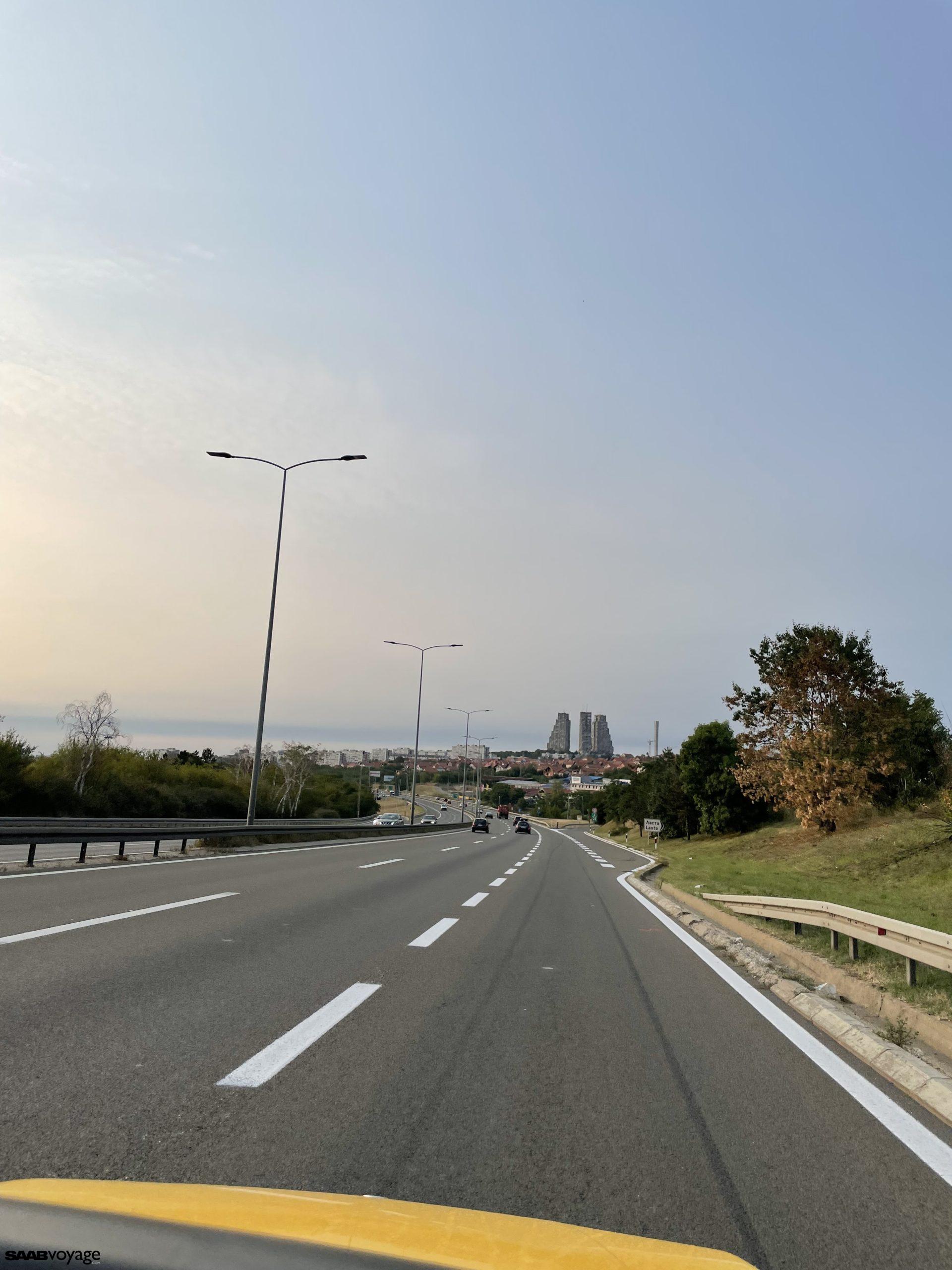
On the Serbian-Hungarian border we stood for almost 2 hours. In the queue we met all kinds of people, especially Germans. At the check, nobody wanted anything from us, we showed our passports and that was it. We felt disappointed, so much standing around for nothing?
Unfortunately, the fact of waiting in line made it impossible for us to eat fish soup in Szeged.
Finally we arrived at a guesthouse in the middle of nowhere, in a small village near Gyor. It was already late, but the host was patiently waiting for us.
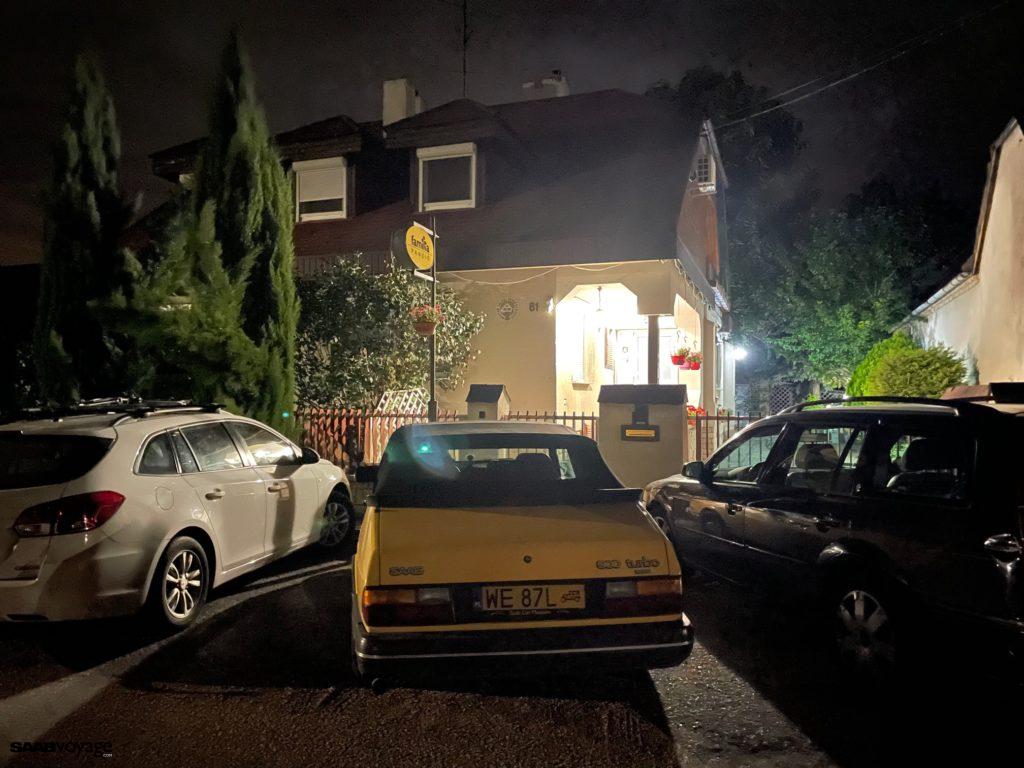
Wednesday
Word of the day: cold! Through Slovakia and the Czech Republic, we reached Katowice on time. And then home at the end of the day. All in all, the surrounding temperature had dropped by some 20 degrees for us in 48 hours. By evening we had closed the roof.
Practical conclusions
The Greek offer and the Greek implementation
First of all, we realised that it happens that the offer presents one thing and in reality we encounter something else. And this is not a one-off situation.
There was supposed to be a washing machine in Thessaloniki, but there wasn’t. Mr Landlord did not see this as a problem and was not willing to help. Well, there is not, but he can give us the addresses of the laundries. Why bother. And that was not the point. A washing machine is an important part of planning a longer trip for us. From your host’s perspective, this by no means meant that he was providing an incomplete service.
On the other hand, there was an invisible laundry in Athens. We asked if we could wash our clothes, the lady host promised to arrange this. Communication was difficult, the phone wouldn’t pick up, on booking.com’s messenger she answered with a terrible delay. Eventually we were able to arrange to leave the bag of dirt in our flat from the door inside. We waited with my our hearts in our mouths, but the next day there was a package of clean clothes at the door. The lady gave the impression that she was very reluctant to meet us. She appeared and disappeared like a ghost. Strange.
When renting a flat, the term “fully equipped kitchen” can mean completely different things. Either there will be a full kitchen with an espresso machine, complete tableware, cutlery, etc., or something that resembles a student party room: glasses, a plate, maybe a spoon of some kind. And that was it. So it sometimes happened that we had to use our own tourist plates and cutlery.
A cashless Greece?
The Greeks are at the stage where the commission for paying by card is a problem for retailers. At the archaeological museum in Athens, we heard that, exceptionally, the terminal was not working today. We persuaded the lady to try – and a miracle happened. At the automobile museum, despite a terminal on the desk, we were simply sent back to the ATM.
As a rule, there is a visa/mastercard sticker on the door of a shop, but inside you will hear that the terminal does not work, there is no internet, the socket to which the terminal is connected does not work. There are countless excuses. And anyway, we know it’s all about the commission.
Internet Greece
Internet in flats works differently, sometimes LTE from mobile phone works better.
Edible Greece
In Greece you don’t have to eat in restaurants along the main pedestrian streets. Take a detour to a pub frequented by Greeks. Also, pop into small shops and ask for things that are not obvious. Thus, in Delphi we had feta from a barrel, not from a factory package. The same is with olive oil, you can ask what you have locally and find a gem. Besides, Greece means tomatoes smelling of the sun, undiluted cucumbers and sweet onions.
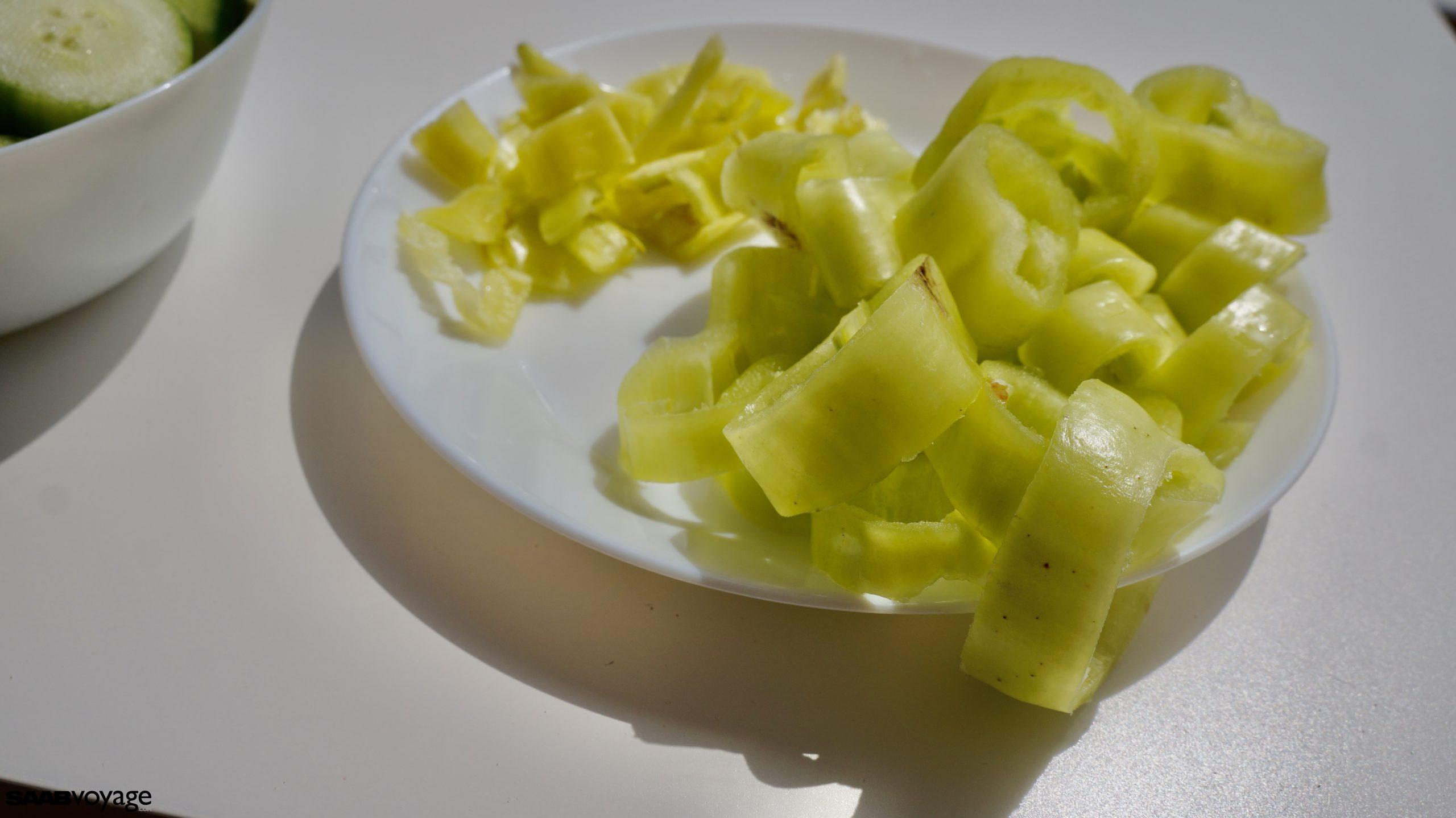
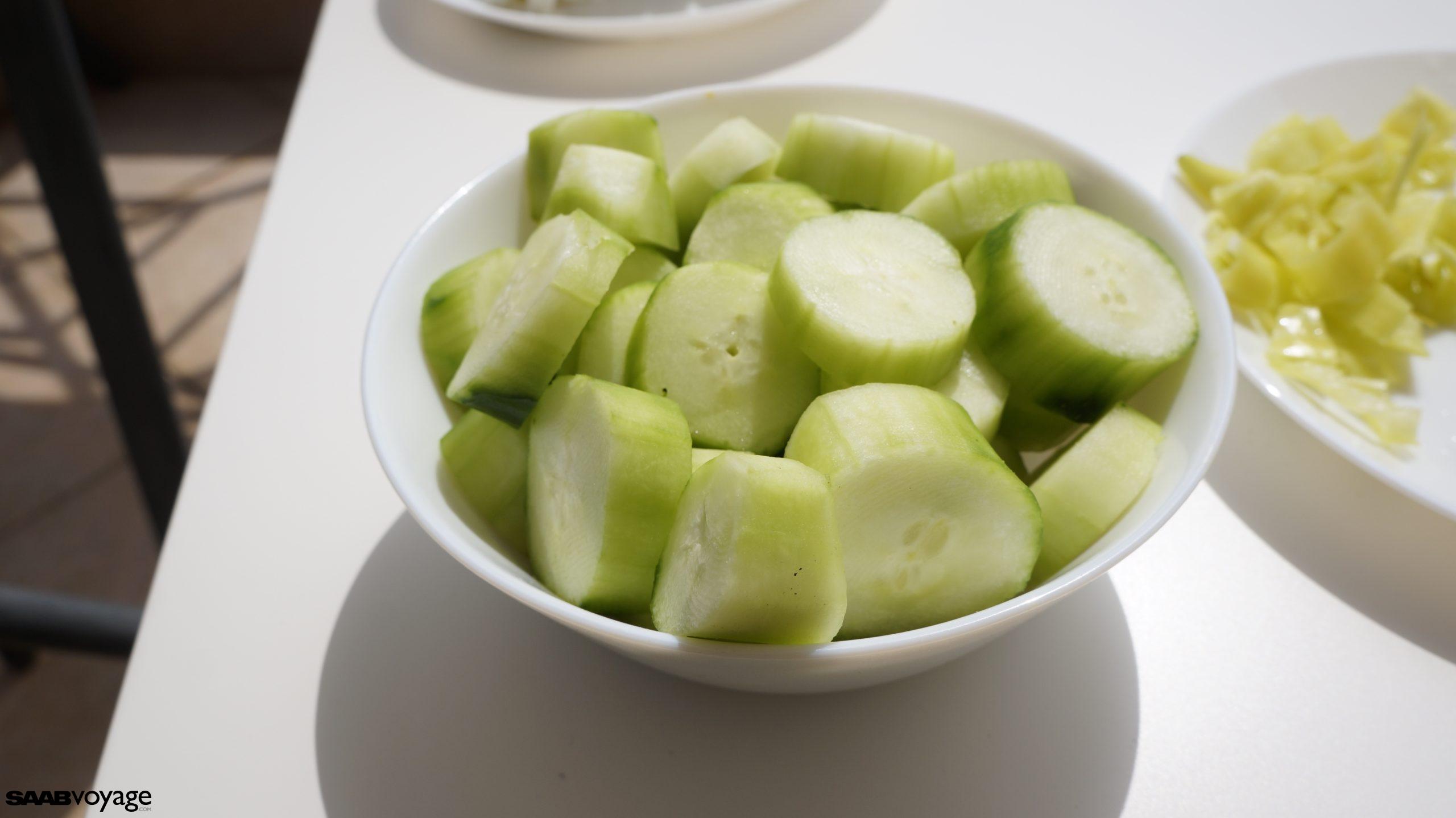
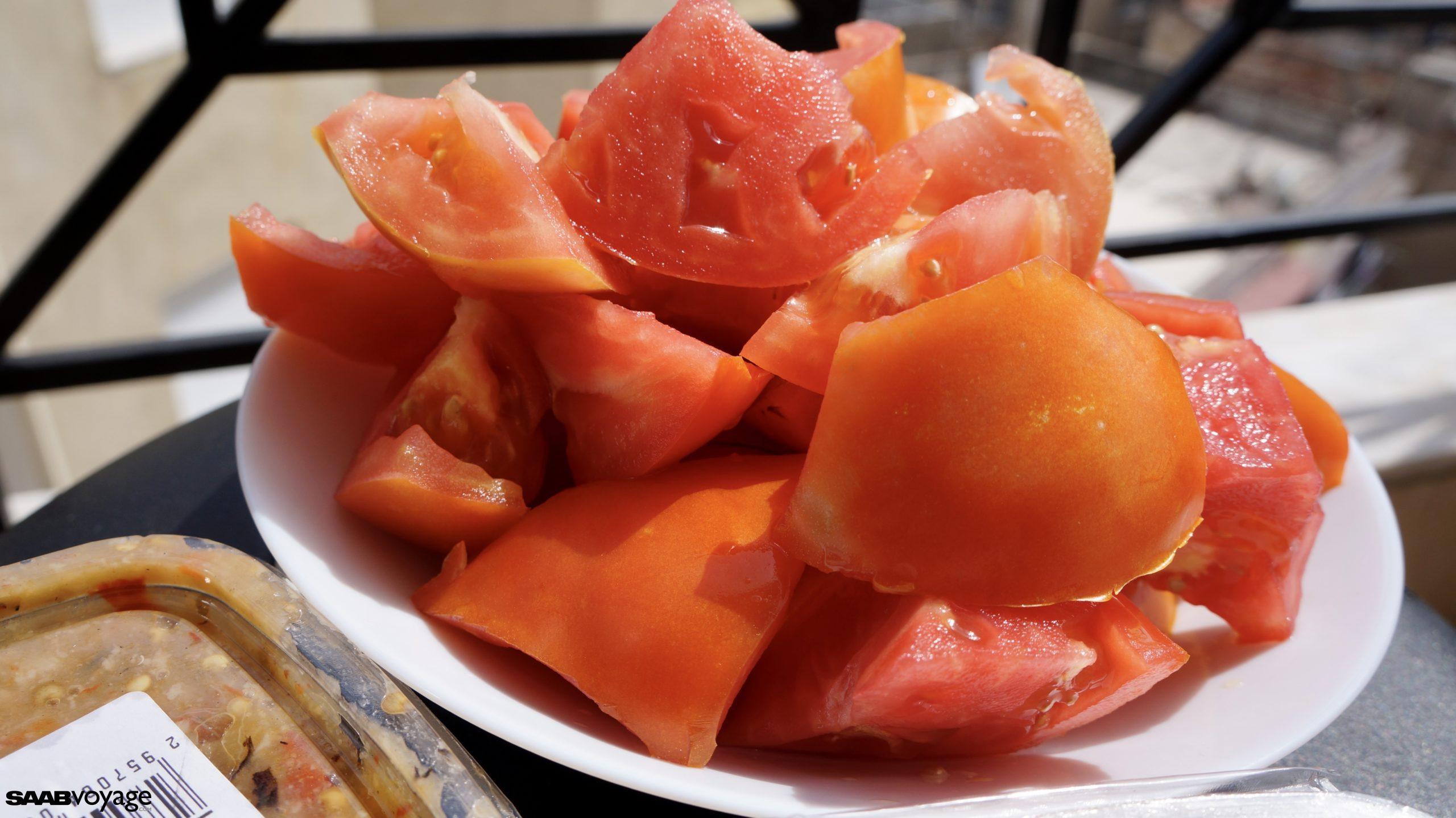
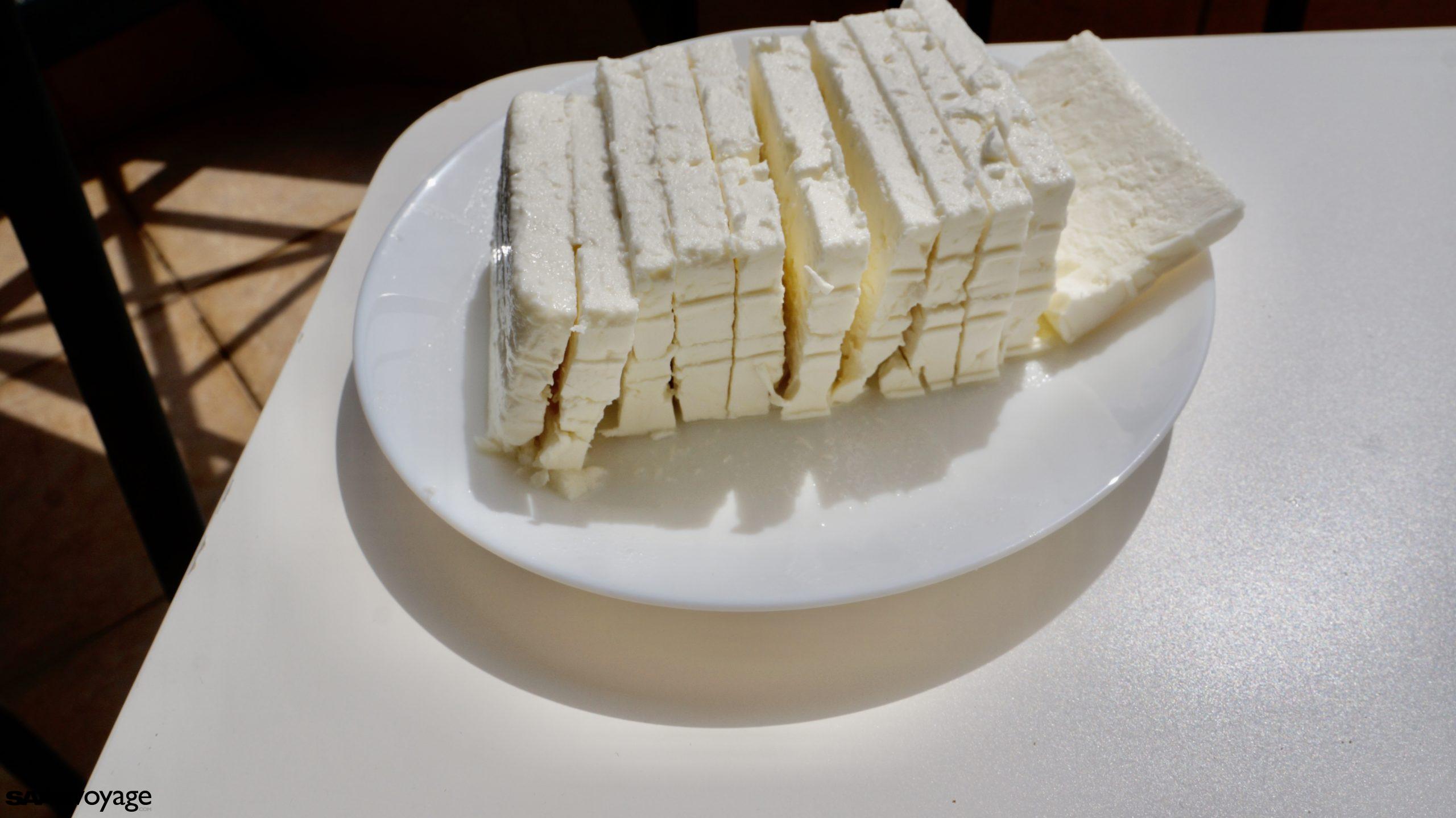
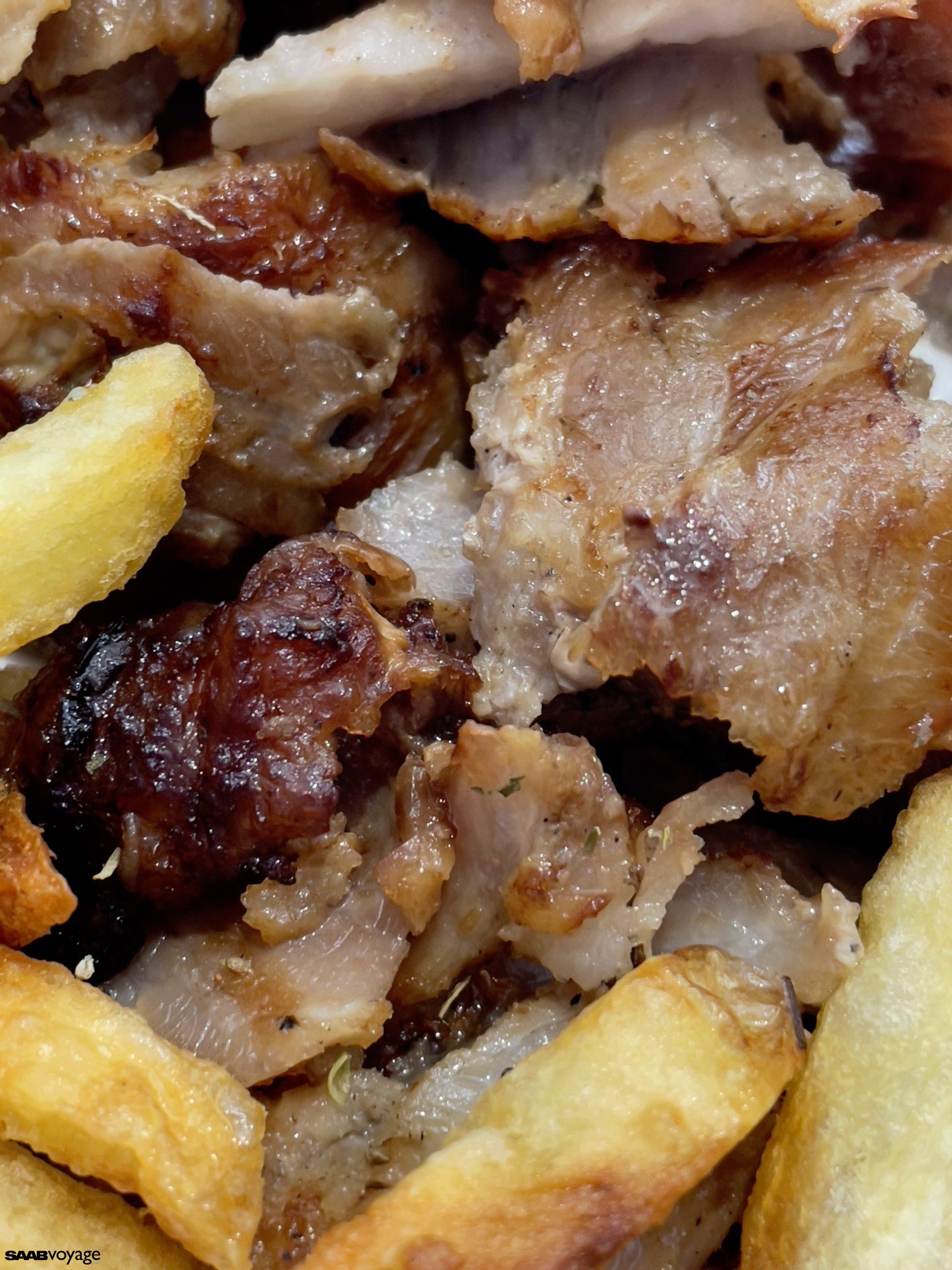
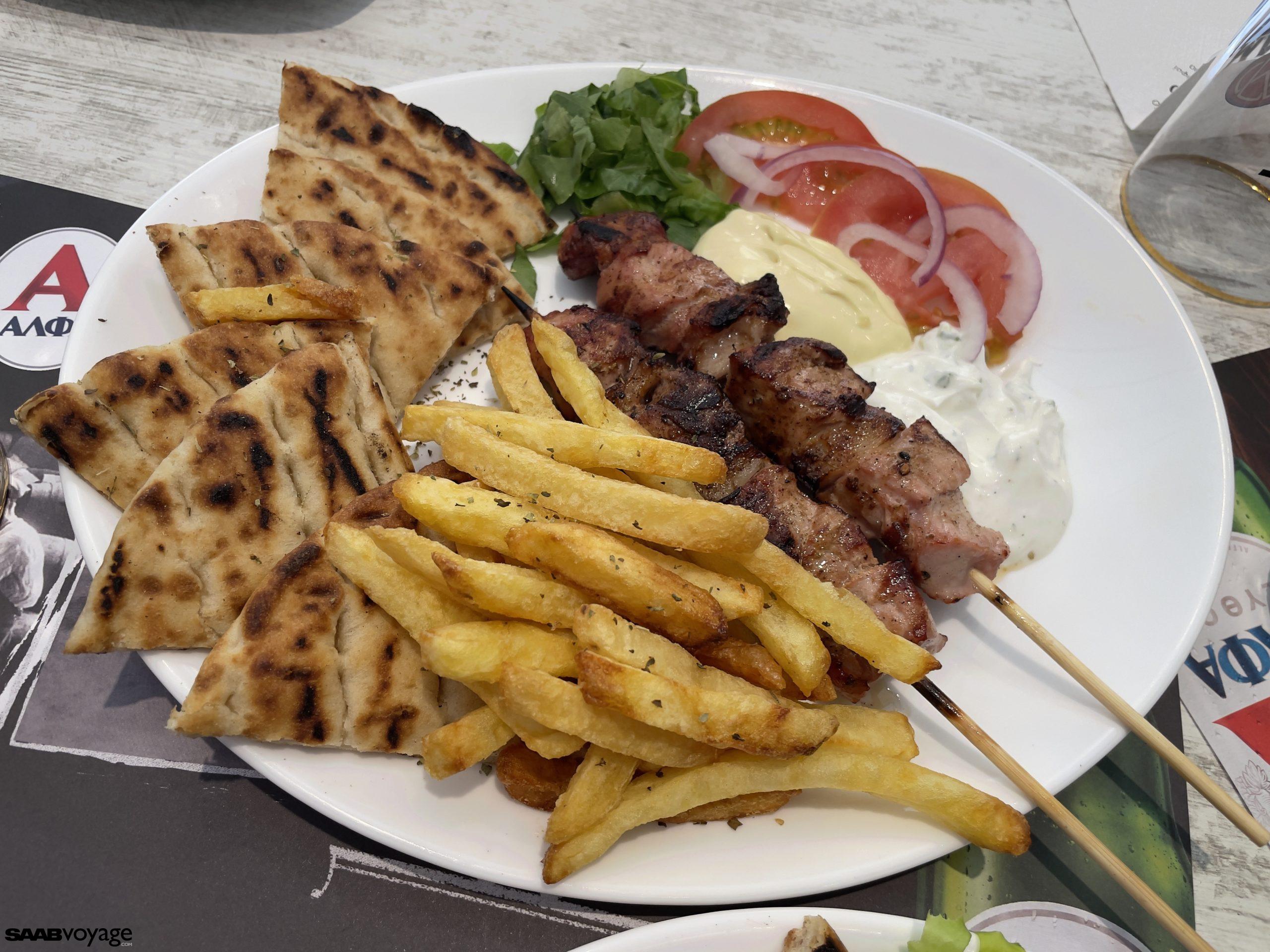
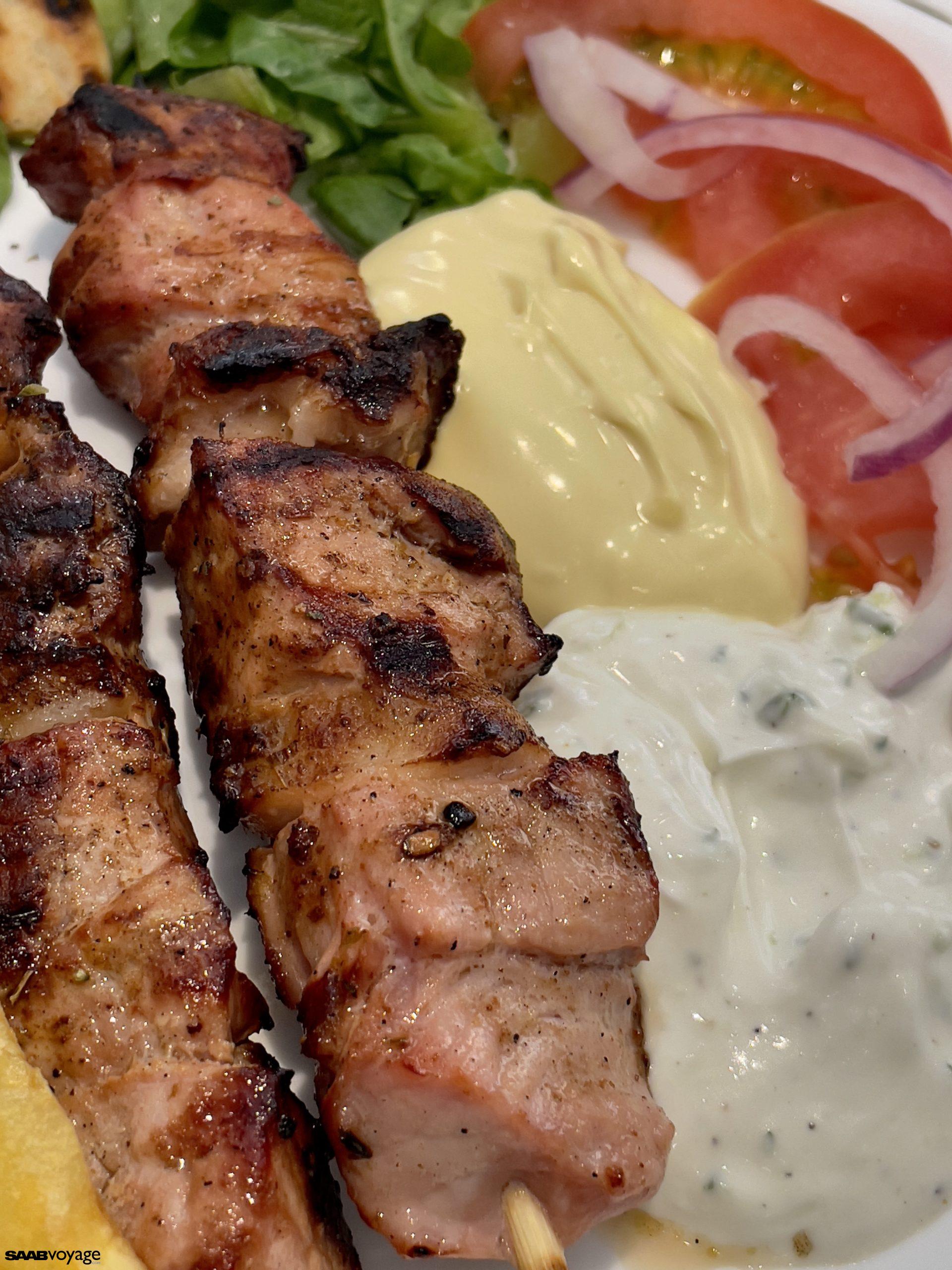
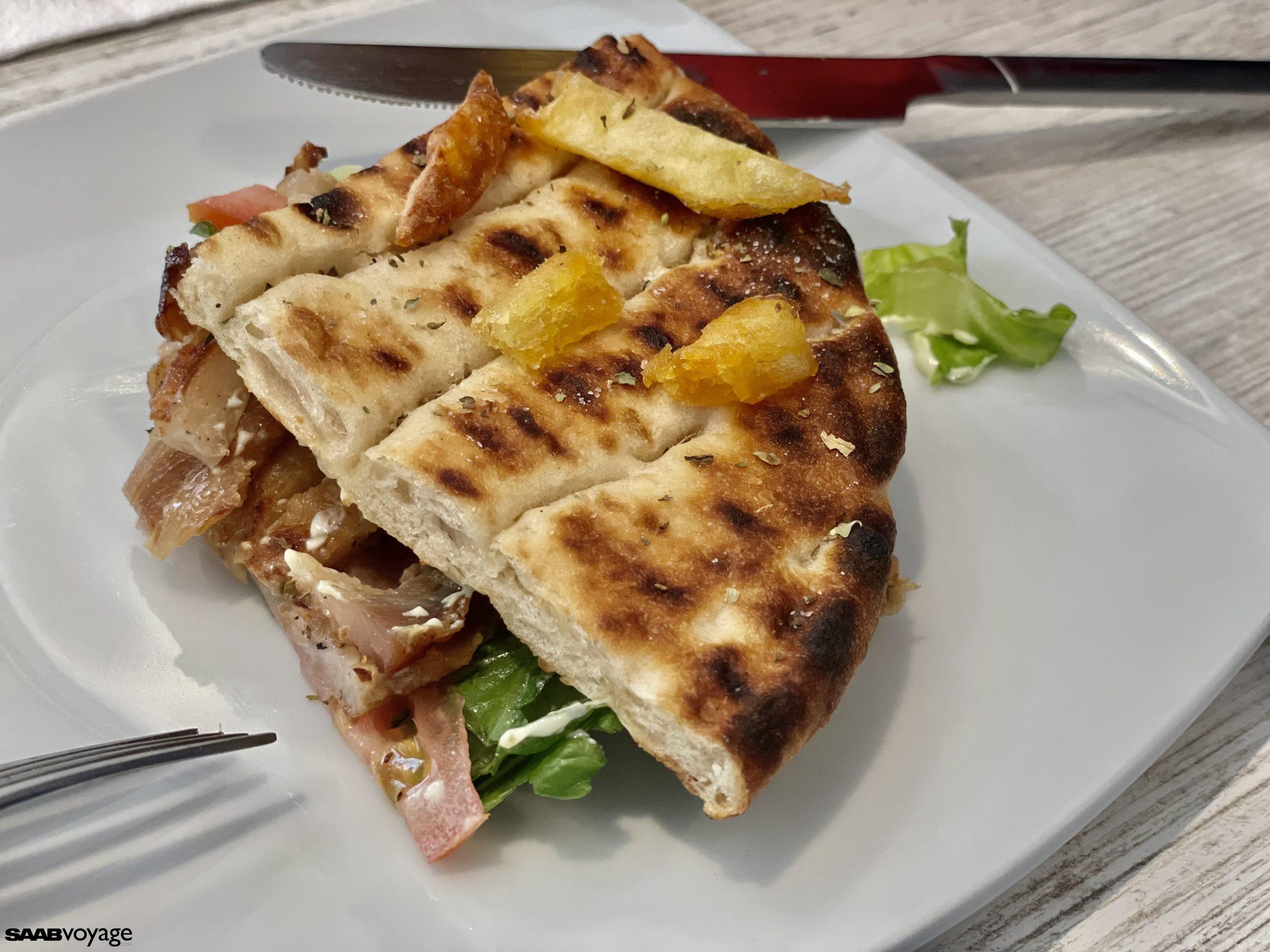
Other curiosities
During the whole trip we met as many as 2 mosquitoes – in Delphi in the hotel, so we assume they were on holiday and came from abroad.
In general, Greece is an uneven country. On the one hand, tourism and the approach to squeeze every last eurocent out of every tourist, on the other hand, we were constantly amazed by the lack of respect for the monuments, which allow to squeeze those cents out of tourists. On the third hand, Greece is a country of contrasts, wealth meets total poverty. Greeks live quietly and at ease, sometimes we wonder what for.

Either way, the country is worth a visit. Not only to spend time with an umbrella drink by the blue sea.
Bonus – Radio Kampus – Kręte Ścieżki
Thanks for your endurance. At the end a bonus. The recording of Kręte Ścieżki programme on Radio Kampus, where we had the pleasure once again to discuss our expeditions with Mateusz. This time we talk about the Greek escapade in a classic Saab.
Did you like the text? Now it’s your turn. We’ll be happy to stay in touch:
- Comment, for you it’s a moment, for us it’s a very important clue.
- If you think this post is valuable or would like to share with other readers – share our post – it means that you appreciate our work.
- Keep in touch, like us on Facebook or Instagram. Every day new photos, inspirations, interesting information.
The form you have selected does not exist.